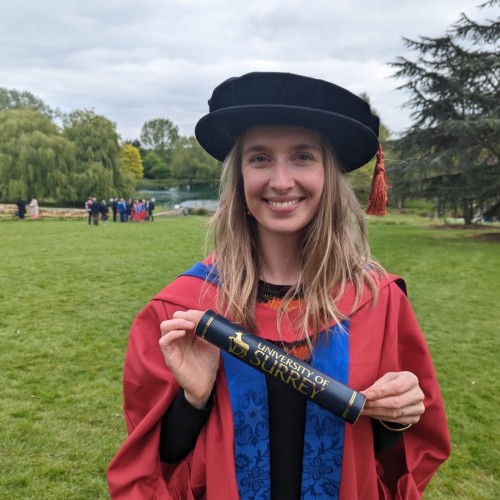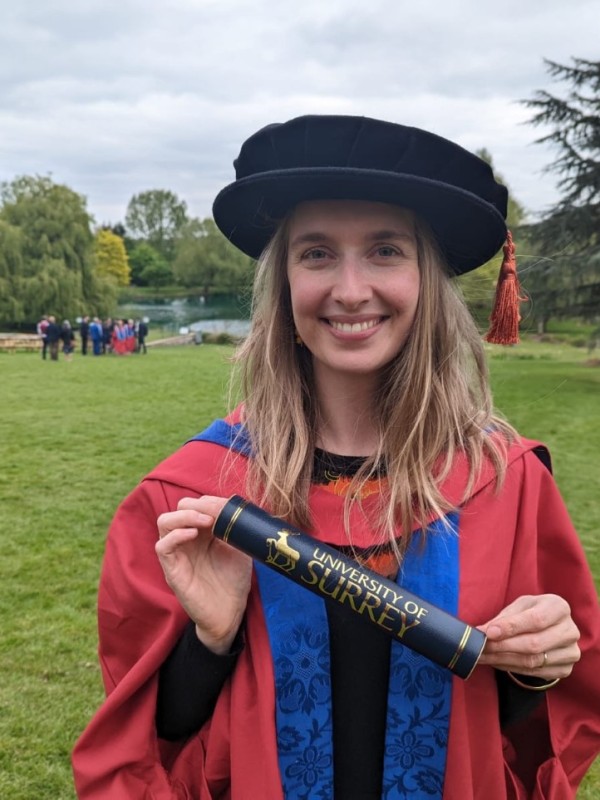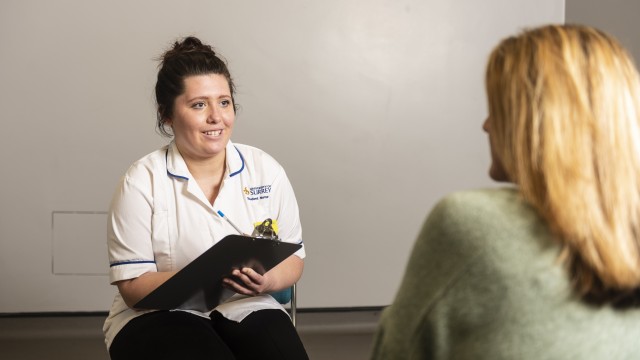
- Health Sciences
PhD Health Sciences
Work in partnership with healthcare providers, governments and businesses to address global healthcare priorities and generate evidence to underpin effective, compassionate and integrated healthcare.
4,138+ people have created a bespoke digital prospectus
Why choose this
programme?
- Join our team of researchers who have been conducting health-related research for over 30 years.
- Embrace a ‘patient focused’ philosophy, working to improve the delivery of healthcare nationally and internationally.
- Work alongside academic staff who are engaged in leading healthcare research, and whose work drives and reflects change in clinical practice.
Statistics
100%
Of our health sciences research graduates are in employment or further education (Graduate Outcomes 2025, HESA)
Top 20 for research outputs
The University of Surrey is ranked in the top 20 for the quality of our research outputs (REF 2021)
33rd for research quality
The University's overall research quality ranking has risen by 12 places to 33rd in the UK (REF 2021)
What you will study
You’ll complete research into your chosen area of interest over a period of four years (full-time) or eight years (part-time).
Your first year will lay the foundation for your research project. You’ll work closely with your supervisors to review literature and develop your research proposal. You may start negotiating access for sites and settings for data collection or consider applying for ethical approval from us and the NHS.
During your second and third years, you’ll conduct fieldwork, collect your data and begin to analyse this. During your final year, you’ll continue to analyse your data and write up your findings, in preparation for your thesis submission.
Throughout your PhD, you’ll gain substantial subject expertise and an in-depth understanding of research methodology and design. You’ll also develop transferable skills in public speaking, drafting proposals and writing for publications.
Assessment
You’ll complete a confirmation process to formally review your project. If you're a full-time student, this will take place around 12-15 months into your studies or 24-30 months if you’re studying part-time. You’ll be required to submit a written report and successfully complete an oral examination.
Your final assessment will be based on the presentation of your research in a written thesis, which will be discussed in a viva examination with at least two examiners. You have the option of preparing your thesis as a monograph (one large volume in chapter form) or in publication format (including chapters written for publication), subject to the approval of your supervisors.
Location
Our medicine, paramedic science, nursing and midwifery, and CPD health sciences courses are taught at the Kate Granger Building (30 Priestley Road) on the Surrey Research Park.
Research themes
We’re addressing global healthcare priorities and generating evidence to underpin effective, compassionate and integrated healthcare, working in partnership with healthcare providers, governments and businesses. Our research investigates:
- Cancer care
- Digital health
- Long-term conditions and ageing
- Maternal, child and family health
- Workforce, organisation and wellbeing.
Throughout your studies you’ll have at least two supervisors from the School of Health Sciences.
Your supervisors will have expertise relevant to your research project, and will give you academic guidance and tuition, helping you develop your research ideas and plans, underpinning your theory and understanding of methodology and analysis. They’ll also give you pastoral support and advice, referring you to more specialist services where necessary.
Research support
The professional development of postgraduate researchers is supported by the Doctoral College, which provides training in essential skills through its Researcher Development Programme of workshops, mentoring and coaching. A dedicated postgraduate careers and employability team will help you prepare for a successful career after the completion of your PhD.
Progress reviews
In addition to the confirmation process you’ll have six-monthly progress reviews with your supervisors. These meetings are an opportunity to reflect on your progress, discuss successes and challenges and set targets for the next six months. These reviews will be monitored by postgraduate research directors and recorded on your student record.
You’ll also have at least one formal meeting with your supervisors every month. The regularity of these will depend on the nature and stage of your project.
Professional development
Our Health Sciences PhD is aimed at healthcare professionals looking to undertake research at the highest level. It’s particularly suited for health psychologists, midwives, nurses, paramedics, pharmacists, physiotherapists and social scientists.
You'll be joining a thriving doctoral community of postgraduate research students who meet weekly and offer peer-support in informal student-led support groups. You’ll also be invited to join one or more of our theme and/or cluster research groups, and benefit from guest speakers and facilitators, from within the University and externally.
We also run training to equip you with contemporary healthcare knowledge and research skills, which includes seminars, writing groups and research methods tuition.
Facilities
Our multimillion-pound facilities give you access to the latest industry equipment, including our Clinical Simulation Centre which features two large wards, a critical care unit, a community flat and an ambulance bay.
Depending on the nature of your research project you may also use other University facilities, including our 5G/6G Innovation Centre for the development of innovative health technologies, and the Innovation for Health Learning Laboratory.
You may also have access to external facilities and equipment if your project is in collaboration with one of our 800+ partners, which includes four local NHS trusts.


Olivia Luijnenburg
Student - Health Sciences PhD


Oluwatoyin Adeniji
Student - Health Sciences PhD
UK qualifications
- A bachelor's degree (2:1 or above) in a health-related or social sciences discipline is required. Candidates with a 2:2 degree may also be considered if they hold a masters degree with a research component.
- A masters degree with a research component is highly desirable. Candidates without an MSc may be considered if they demonstrate substantial equivalent research or professional experience in health-related fields.
- We welcome applicants with strong methodological expertise who can show a clear interest in applying their skills to health-related research.
English language requirements
IELTS Academic: 6.5 or above (or equivalent) with 6 in each individual category.
These are the English language qualifications and levels that we can accept.
If you do not currently meet the level required for your programme, we offer intensive pre-sessional English language courses, designed to take you to the level of English ability and skill required for your studies here.
Selection process
Selection is based on applicants:
- Meeting the expected entry requirements and providing all relevant documents including a satisfactory research proposal
- Being shortlisted through the application screening process
- Completing a successful interview
- Providing suitable references.
Fees per year
Explore UKCISA's website for more information if you are unsure whether you are a UK or overseas student. View the list of fees for all postgraduate research courses.
* Please note: any start date other than September will attract a pro-rata fee for that year of entry (75 per cent for January, 50 per cent for April and 25 per cent for July).
July 2026 - Full-time
- UK
- £5,006
- Overseas
- £23,900
July 2026 - Part-time
- UK
- £2,503
- Overseas
- £12,000
October 2026 - Full-time
- UK
- £5,238
- Overseas
- £24,900
October 2026 - Part-time
- UK
- £2,619
- Overseas
- £12,500
January 2027 - Full-time
- UK
- £5,238
- Overseas
- £24,900
January 2027 - Part-time
- UK
- £2,619
- Overseas
- £12,500
April 2027 - Full-time
- UK
- £5,238
- Overseas
- £24,900
April 2027 - Part-time
- UK
- £2,619
- Overseas
- £12,500
- Annual fees will increase by 4% for each year of study, rounded up to the nearest £100 (subject to legal requirements).
Additional costs
There are additional costs that you can expect to incur when studying at Surrey.
Funding
A Postgraduate Doctoral Loan can help with course fees and living costs while you study a postgraduate doctoral course.
How to apply
Prior to making a formal application, in the first instance, please email a copy of your CV, outline research proposal of your intended study and funding details copied to both Dr Freda Mold (freda.mold@surrey.ac.uk) and Dr Jenny Harris (jen.harris@surrey.ac.uk). This information will support the identification of an available supervision team.
The outline research proposal should be structured (comprising of an introduction, outline research question, aims/objectives, methods between 5-7 pages, plus references). By providing us with an outline we are better able to identify available academic supervisors who might share your interests.
Please note that due to the large number of requests for PhD supervision we are not able to respond to all enquiries. If you have not heard back from us within 6 to 8 weeks you should assume that we were not able to identify a suitable supervisor within the School of Health Sciences.
After registration
Students are initially registered for a PhD with probationary status and, subject to satisfactory progress, subsequently confirmed as having PhD status.
Apply online
To apply online first select the course you'd like to apply for then log in.
Select your course
Choose the course option you wish to apply for.
Sign in
Create an account and sign into our application portal.
The closing date is the last day this month is available for applications, but if you are applying through a studentship you must follow the deadline on the advert to be eligible.
ApplyThe closing date is the last day this month is available for applications, but if you are applying through a studentship you must follow the deadline on the advert to be eligible.
ApplyThe closing date is the last day this month is available for applications, but if you are applying through a studentship you must follow the deadline on the advert to be eligible.
ApplyThe closing date is the last day this month is available for applications, but if you are applying through a studentship you must follow the deadline on the advert to be eligible.
ApplyThe closing date is the last day this month is available for applications, but if you are applying through a studentship you must follow the deadline on the advert to be eligible.
ApplyThe closing date is the last day this month is available for applications, but if you are applying through a studentship you must follow the deadline on the advert to be eligible.
ApplyThe closing date is the last day this month is available for applications, but if you are applying through a studentship you must follow the deadline on the advert to be eligible.
ApplyThe closing date is the last day this month is available for applications, but if you are applying through a studentship you must follow the deadline on the advert to be eligible.
ApplyAbout the University of Surrey
Need more information?
Contact our Admissions team or talk to a current University of Surrey student online.
Code of practice for research degrees
Surrey’s postgraduate research code of practice sets out the University's policy and procedural framework relating to research degrees. The code defines a set of standard procedures and specific responsibilities covering the academic supervision, administration and assessment of research degrees for all faculties within the University.
Download the code of practice for postgraduate research admissions (PDF).
Terms and conditions
When you accept an offer to study at the University of Surrey, you are agreeing to follow our policies and procedures, student regulations, and terms and conditions.
We provide these terms and conditions at the offer stage and are shown again at registration. You will be asked to accept these terms and conditions when you accept the offer made to you.
View our generic registration terms and conditions (PDF) for the 2025/26 academic year, as a guide on what to expect.
Disclaimer
This online prospectus has been published in advance of the academic year to which it applies.
Whilst we have done everything possible to ensure this information is accurate, some changes may happen between publishing and the start of the course.
It is important to check this website for any updates before you apply for a course with us. Read our full disclaimer.






